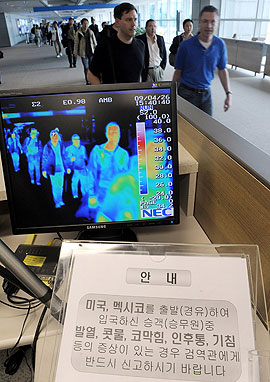N Zealand confirms swine flu cases
Confirmation comes as Australia approves powers to detain suspected virus carriers.

| In depth |
|
|
So far the only deaths from swine flu have been recorded in Mexico – the epicentre of the outbreak, where more than 150 people are suspected to have died from the virus.
The three New Zealand cases were confirmed as swine flu on Tuesday evening, after 14 people were reported to have contracted influenza A, the virus type that causes the disease.
Tests on other samples were ongoing, but the three positive tests are being taken as an indication the rest had also contracted swine flu.
|
“Because of their travel history… we need to assume that this is swine flu” Julia Peters, |
Officials said two of the three confirmed cases were not part of a high school group that had recently visited Mexico.
Ten students and one teacher from a group of 25 from an Auckland secondary school had come down with flu-like symptoms after returning from a visit to Mexico last weekend.
The affected students and teacher had been in quarantine and treated with anti-viral drugs since Sunday.
New Zealand’s health ministry on Wednesday said all three confirmed cases were people who had travelled to Mexico or North America recently.
“Because of their travel history… we need to assume that this is swine flu,” said Julia Peters of the regional public health service in Auckland.
Tony Ryall, New Zealand’s health minister, said a WHO laboratory in Australia had tested three samples out of 11 and confirmed they had the H1N1 flu strain associated with swine flu.
“Officials have informed me that [that] is sufficient to indicate that swine flu is the cause of the illness experienced by the group,” Ryall told a news conference.
 |
| Asian governments have set up health checks and advisories at major airports [AFP] |
He said all those affected appeared to have only mild symptoms and had been responding to treatment, adding they were “recovering at home”.
New Zealand has also raised the alert level of its national pandemic plan and is screening all flights arriving from North America.
Elsewhere in the region health officials are conducting tests on other suspected cases as well as ramping up efforts to detect and contain the virus.
As a precaution, the Australian government said on Wednesday that it had granted health authorities more powers in their efforts to contain disease, as more than 100 people with flu symptoms were being tested for possible infection.
The new measures include authorisation to make sure that people showing flu-like symptoms are isolated or detained if they do not cooperate.
“We have no reason to believe that the Australian public will be anything other than fully cooperative but we do want to ensure that we have powers to act quickly when we know in a situation like this that the circumstances can change very quickly,” Nicola Roxon, Australia’s health minister, told reporters.
In South Korea the health ministry said it was investigating five suspected swine flu infections, after tests returned negative on four of the nine suspected cases announced earlier on Wednesday.
The Korea Centres for Disease Control and Prevention said the people with suspected infections had recently returned from trips to Mexico or the United States, and showed flu-like symptoms such as coughing and fever.
Officials are also investigating a “probable” case announced on Tuesday, of a 51-year-old Catholic nun who had returned home on Sunday from a visit to Mexico.
She is said to be recovering well after anti-viral treatments.
South Korea’s agriculture ministry said it would immediately ban live pig imports from North America as a precaution.
The Japanese government has urged its citizens in Mexico to immediately return, saying they might find themselves unable to leave if the outbreak spreads and to get adequate medical care.
In China officials promised to disclose any cases promptly following calls in state-run newspapers for openness and to avoid the kind of cover-up that brought panic during the Sars virus outbreak in 2003.

 Q&A: What is swine flu?
Q&A: What is swine flu?